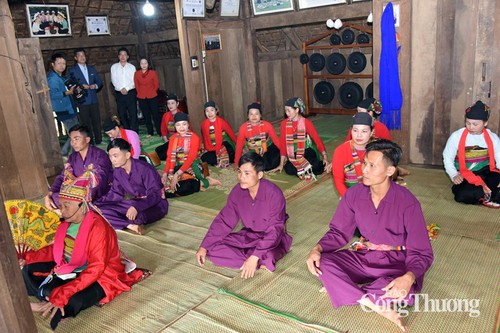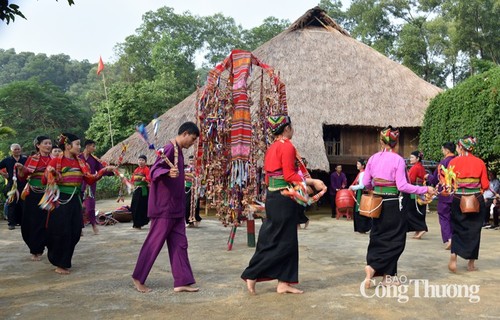 Also known as the Flower Tree Festival, Poon Poong takes place during the first lunar month or the full moons of March and July. (Photo:congthuong.vn) Also known as the Flower Tree Festival, Poon Poong takes place during the first lunar month or the full moons of March and July. (Photo:congthuong.vn) |
Muong local Bui Hong Nhi said that in the Muong language, ‘Poon’ signifies playing or dancing, while “Poong” refers to flowers. “Poon Poong” translates to dancing around the flower tree.
"This festival is led by ‘Au May’, a respected female villager who is knowledgeable in traditional worship, medicine, dancing, and singing,” he said.
Poon Poong has two main parts: a ritual and a festival. During the ritual, the “Au May”, acting as a shaman, recites the story of the creation of heaven and earth, reports to the Genies about the bountiful harvest, and expresses gratitude to them for favorable weather. The villagers then celebrate with festivities.
Besides the “Au May”, the festival requires at least six other people to perform singing and dancing around the flower tree, the centerpiece of the festival. Locals believe that this hand-crafted tree symbolizes the vast universe, and merges all things that nature has given to humans. Creating the flower tree means repaying gratitude to the Genies and inviting them to join the festivities with the locals.
This flower tree is adorned with 5 or 7 tiers of colorful flower clusters crafted from dyed cypress wood, featuring animal or tool shapes. The number of tiers, ranging from 5 to 9, reflects the skill and status of the “Au May” ladies, consequently varying the height of the tree.
Bui Van Dong, a Muong local in Ngoc Lac district, Thanh Hoa province, said that the locals decorate the tree with painted wooden animals and flowers, along with colorful fabrics for wrapping.
 Muong people dance around the "flower tree" during the Poon Poong festival. (Photo:congthuong.vn) Muong people dance around the "flower tree" during the Poon Poong festival. (Photo:congthuong.vn) |
Crafting the tree requires skilled artisans, and demands plenty of time and meticulous effort. Pham Thi Bao from Ngoc Lac district said the Poon Poong festival typically occurs in the first lunar month, but it now also happens on other special occasions.
"In my hometown, on the 7th day of the lunar year, a flower tree is erected either in the commune center or at the temple gate, where people gather to dance and sing," Bao said, adding that "the ‘Au May’ leads the worship and prayer, while others engage in dancing, singing, and playing gongs."
Throughout history, the Poon Poong Festival has remained largely unchanged, preserving the cultural traditions of the past, according to Bui Van Dong who continued to say that every village and commune hosts the festival, with each village celebrating it on a different day during the first lunar month.
All performances center around the flower tree, mirroring the customs and traditions of the Muong people, while showcasing their cultural and spiritual life. Participants wear traditional attire, with scarves draped over their shoulders to accentuate the gracefulness of their dance. Their movements simulate various aspects of daily life, including allocating land and water, constructing houses, warding off wild animals, and planting crops. Afterward, they dance around the flower tree, singing love songs and making promises, accompanied by the sound of gongs.
"When there’s a flower tree, we come together to dance, sing, and enjoy liquor. Our dances depict actions like land and water allocation, representing how parents distribute these resources among their children," said Bao.
In addition to the flower tree, there’s a table set with liquor and local specialties including five-color sticky rice, and Loong and Mon soup. The Ministry of Culture, Sports, and Tourism recognized the Poon Poong Festival as a National Intangible Cultural Heritage in 2017.